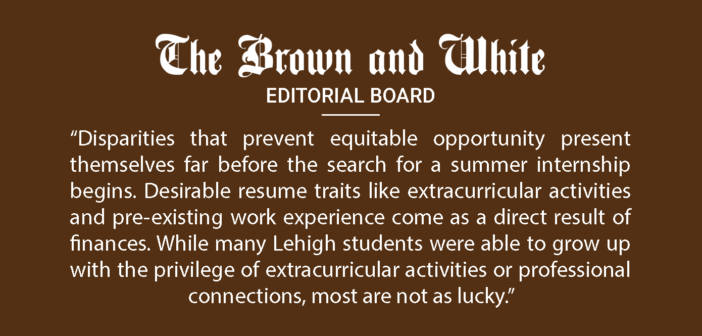With Handshake and Lehigh Connects bookmarked on our internet search engines and Career Center appointments piling up, Lehigh students are preparing to endure the job search season, this time with the added pressures of COVID-19.
Getting a summer internship is no easy task, and doing so during a global pandemic and economic recession only exacerbates those difficulties.
And this frustration only builds when an eventual internship offer is accompanied by the word, “unpaid.”
The controversy over the unpaid internship has spread in recent years, gaining attention from industry leaders and various politicians.
For many, dedicating time away from academics to an uncompensated role simply is not an option.
While some are able to afford working a full time job with the sole objective of building their resume, those who don’t have that option are only further disadvantaged.
The internship application process perpetuates an inherently unfair playing field, favoring those who have a higher socioeconomic status.
It becomes so that the amount of experience on someone’s resume is not only a product of their qualifications, but also their family’s financial background.
Disparities that prevent equitable opportunity present themselves far before the search for a summer internship begins. Desirable resume traits like extracurricular activities and pre-existing work experience come as a direct result of finances. While many Lehigh students were able to grow up with the privilege of extracurricular activities or professional connections, most are not as lucky.
This creates an inequitable cycle in the work sphere.
Historically, the students who grow up with the most money have ended up receiving higher paying jobs due to circumstances that have allowed for more work experience, making them more hirable.
And in the U.S., socioeconomic status and race are often intertwined, which then presents issues of job opportunity at higher rates for racial minorities than for white people.
According to 2018 U.S. Census data, it was found that 25.4 percent of Native Americans, 20.8 percent of Black people, and 17.6 percent of Hispanic people, were living in poverty, whereas only 10.1 percent of both White and Asian individuals were at that level.
Recent results from the Programme of International Student Assessment, found that American education continues to be characterized by distinct racial inequalities not only in academic performance of students of color, but also in opportunities they have throughout their education.
Within a school population like Lehigh’s, that lacks diversity–out of 5,203 undergraduate students, 61 percent are white–we must be doing more to address the racial inequality in professional opportunities.
This issue is only furthered by the inequity in strategically planned, fast-tracked job opportunities across the three colleges at our university.
Thirty-seven percent of the school’s undergraduate population is in The College of Arts & Sciences, 24 percent in the College of Business and 25 percent in the P.C College of Engineering and Applied Science, yet the majority of job opportunities that Lehigh students see are focused in the business and engineering schools.
The career fair that Lehigh holds primarily hosts employers that cater to engineering and business students, so much so that arts and sciences students often view it as fruitless to even attend.
For many students at Lehigh, success is equated with the dollar amount on that salary check, which in itself is an extremely privileged mindset to have.
If there is already a sense of inequality in job opportunity across the colleges, it becomes an even larger issue for minority students at Lehigh.
Lehigh needs to divert its focus from helping already privileged students get the highest paying job possible, that they can boast about on their University Statistics page, and redirect it to increasing job opportunities for those who struggle to keep up with the competition through no fault of their own.
This is now all the more important with Lehigh’s newfound objective to become an anti-racist institution.
Where you’re from, how you look and how much money you have, should not be what holds you back from fair compensation and equitable opportunity in the workforce.






Comment policy
Comments posted to The Brown and White website are reviewed by a moderator before being approved. Incendiary speech or harassing language, including comments targeted at individuals, may be deemed unacceptable and not published. Spam and other soliciting will also be declined.
The Brown and White also reserves the right to not publish entirely anonymous comments.
2 Comments
“While many Lehigh students were able to grow up with the privilege of extracurricular activities or professional connections, most are not as lucky.” I’m with you.
“The controversy over the unpaid internship has spread in recent years, gaining attention from industry leaders and various politicians.” Typically college students should be workers worth paying and should be paid unless the internship entity finds it impossible to do so (some non-profits). It you can’t get worthwhile effort out of a college student, chances are it is your fault. I’m with you.
“And in the U.S., socioeconomic status and race are often intertwined, which then presents issues of job opportunity at higher rates for racial minorities than for white people.” This sentence starts the questionable portion of the editorial.
“Thirty-seven percent of the school’s undergraduate population is in The College of Arts & Sciences, 24 percent in the College of Business and 25 percent in the P.C College of Engineering and Applied Science, yet the majority of job opportunities that Lehigh students see are focused in the business and engineering schools.” I believe this was true of opportunities 50 years ago although I can’t vouch for the same College percentage breakdown at that time. Maybe all job opportunities are reduced due to the increased number of college graduates and the increased competition for those jobs.
“Within a school population like Lehigh’s, that lacks diversity–out of 5,203 undergraduate students, 61 percent are white–we must be doing more to address the racial inequality in professional opportunities.” 50 years ago it was 95%+ white and all male. The marketplace provides the professional opportunities and it is the University’s task to provide an education that the market requires; even more so for a private institution such as Lehigh.
How many students base their education on what they like and then complain about the lack of pay for their chosen career. It may be a tad unethical for universities to have curricula to entice students while meeting the demands for diversity; even if the University can surmise that the cost outweighs the benefits. Isn’t it the responsibility of student/graduates to consider their choices? We should have freedom of choice but probably not a guarantee of outcomes.
“Where you’re from, how you look and how much money you have, should not be what holds you back from fair compensation and equitable opportunity in the workforce.” I think their are many examples in which where one was from, how one looked and how much money one had did not hold that person back. There are a significant number of people for whom performance is the measure of worth. Unfortunately the majority operates otherwise. We are dealing with humans here, many of whom are unconcerned with most of the others unless there is some benefit for themselves involved.
Editorial II: If you can’t level the playing field, raise the skill level. As a former Lehigh basketball coach stated: The strong take from the weak, and the smart take from the strong.
delightful to hear the spring wail of the LAS and SJW grads-to-be as there are few jobs and they go through the levels of acceptance and resign themselves finally to become teachers, go to grad school, become entrepreneurs, nurses, officers, get married, or enter a general management program. I’ve heard it since the 1970’s so nothing is new to me. these complaints likely go back more than my 50 years.
you want to be valuable, then have you have to have skills. you can learn some skills at uni but those in the US have devolved since the 1990’s as students came in better prepared with more IB and AP credits. fewer taught in school then employers rely on internships even more. you want to get rid of internships have more major classes taught and fewer fluff classes.
right now half of what students learn in the business school is a waste – yes 58 credits of garbage. half of their college years and $125K of tuition that employers do not value. eng waste about half that (making them even more valuable). and LAS and SJW have nothing employers want unless you are a math major…see the pattern.
the more classes that you take that a business does not have to teach you (or what you gain from the internships) the more desirable you are to them. it is almost like businesses are profit oriented self interested decision makers – hmmm.